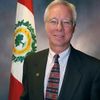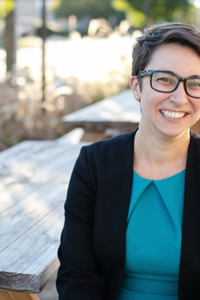Nicole Stewart
Nicole Stewart was an at-large member of the Raleigh City Council in North Carolina. Stewart assumed office in 2017. Stewart left office on December 5, 2022.
Stewart ran for re-election for an at-large seat of the Raleigh City Council in North Carolina. Stewart won in the general election on October 8, 2019.
Biography
Nicole Stewart was born in Apex, North Carolina, and lives in Raleigh, North Carolina. Her career experience includes working as a fundraiser with NC Conservation Network.[1] Stewart was elected to serve as the At-Large City Council member for Raleigh in 2017.[2]
Elections
2019
See also: City elections in Raleigh, North Carolina (2019)
General election
General election for Raleigh City Council At-large (2 seats)
The following candidates ran in the general election for Raleigh City Council At-large on October 8, 2019.
Candidate | % | Votes | ||
| ✔ |  | Nicole Stewart (Nonpartisan) | 33.7 | 30,960 |
| ✔ |  | Jonathan Lambert-Melton (Nonpartisan)  | 23.1 | 21,183 |
 | Russ Stephenson (Nonpartisan) | 19.4 | 17,805 | |
 | Portia Wilson Rochelle (Nonpartisan) | 12.5 | 11,449 | |
 | Carlie Allison Spencer (Nonpartisan) | 6.0 | 5,502 | |
 | James Bledsoe (Nonpartisan) | 4.9 | 4,484 | |
| Other/Write-in votes | 0.4 | 382 | ||
| Total votes: 91,765 | ||||
 = candidate completed the Ballotpedia Candidate Connection survey. = candidate completed the Ballotpedia Candidate Connection survey. | ||||
| If you are a candidate and would like to tell readers and voters more about why they should vote for you, complete the Ballotpedia Candidate Connection Survey. | ||||
Do you want a spreadsheet of this type of data? Contact our sales team. | ||||
2017
The city of Raleigh, North Carolina, held municipal elections for mayor and city council on October 10, 2017. A runoff took place on November 7, 2017, in those races where no candidate received a majority of the vote. The filing deadline for candidates who wished to run in this election was July 21, 2017. All seven council seats were up for election.
Russ Stephenson received a majority of the vote and was re-elected. While Nicole Stewart did not receive a majority, Stacy Miller declined to ask for a runoff.[3][4]
| Raleigh City Council, At-large Municipal Election, 2017 | ||
|---|---|---|
| Candidate | Vote % | Votes |
| 28.26% | 26,680 | |
| 23.00% | 21,714 | |
| Stacy Miller | 16.55% | 15,623 |
| Shelia Alamin-Khashoggi | 11.46% | 10,822 |
| Zainab Baloch | 11.02% | 10,406 |
| Robert Ward | 7.52% | 7,104 |
| Rob Axtell | 1.99% | 1,878 |
| Write-in votes | 0.2% | 193 |
| Total Votes | 94,420 | |
| Source: North Carolina State Board of Elections, "10/10/2017 Unofficial Municipal Election Results - Wake," accessed October 10, 2017 | ||
Campaign themes
2019
Ballotpedia survey responses
See also: Ballotpedia's Candidate Connection
Nicole Stewart did not complete Ballotpedia's 2019 Candidate Connection survey.
Campaign website
Stewart's campaign website stated the following:
| “ | I am working to ensure your Raleigh City Council prioritizes our shared values of economic, social, and environmental sustainability for all. By bringing diverse voices to the table and focusing on our future, we can build a Raleigh that is inclusive and beneficial for everyone.
Here are the issues I’ve prioritized while serving on City Council:
We can accomplish all of this by ensuring everyone’s voice is at the table. Raleigh is a diverse and growing city, and government leadership should reflect not just who we are, but also where we're going. I support a robust citizen engagement program - one that recognizes that we need different approaches to engage people and creates a sustained two-way dialogue. I’ve prioritized building relationships with various groups in our community, including accessibility advocates, immigrants, environmentalists, bicycle advocates, nonprofits and businesses that build housing, business and community leaders, and many others. The benefits of this are clear and result in policies that meet the needs of our residents, not just a vocal minority. For example, we engaged with stakeholders to create the first accessible parking spaces downtown. We also are working with mobile retail and food truck vendors to open up more access for them to operate, and consulting with environmental leaders to implement a climate pollution reduction goal.. Working together, we can build a future that creates opportunities for everyone.[5] |
” |
| —Nicole Stewart's campaign website (2019)[6] | ||
See also
2019 Elections
External links
Footnotes
- ↑ NicoleForRaleigh.com, "About Nicole," accessed August 24, 2019
- ↑ RaleighNC.gov, "Nicole Stewart," accessed August 24, 2019
- ↑ North Carolina State Board of Elections, "10/10/2017 Unofficial Municipal Election Results - Wake," accessed October 10, 2017
- ↑ The News & Observer, "Longtime Raleigh City Council member Bonner Gaylord won’t call for a runoff election," October 12, 2017
- ↑ Note: This text is quoted verbatim from the original source. Any inconsistencies are attributable to the original source.
- ↑ Nicole Stewart's campaign website, “Issues,” accessed August 24, 2019
| |||||||||








